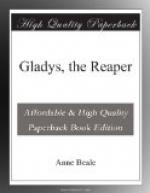But strength came at last, and like one arising out of a horrid dream, Rowland got up from his anguish, and looked out into the night. The moon was too tender and beautiful for his mood at that time; he roughly drew down the blind, took a box of matches from the table, and lighted a candle. Then he paced up and down the room, and suddenly thought of Howel and Netta. He knew not how the transition took place, but he immediately accused himself of having been hard to them. Does any one ever fully sympathise with another, until he has felt as he does? No, we should not judge our weak fellow mortals so harshly, if we knew all their temptations and trials.
Then, again, Miss Gwynne returned to him, with her pride and coldness. How could he love such a woman? he, whose beau ideal of feminine perfection was a creature of gentleness, love, and pity? but he would think of her no more. She, at least, should discover that he was as proud as herself.
Yes, he was proud, he knew it, and now, he would glory in his pride instead of trample it down, as he had been of late trying to do, as an arch tempter; he should be justified in showing pride for her pride.
Again a gentler and better mood came. Was he not vain, ambitious, ridiculous in her eyes, for venturing to speak to her as he had done? Doubtless he had been wrong, but she needed not to spurn him as she had done; she might have told him so as a friend. Friend! she thought him beneath her friendship.
But we will not pursue these musings further; every kind and degree of feeling alternated for nearly two hours, when, as if by some sudden impulse or resolution, Rowland sat down and determined to write his sermon. It should be upon pride, and should touch her as well as himself. He found pleasure in thinking of all the texts in which the word occurs, in looking for them, and considering which was the most biting.
A hasty knock at his door interrupted this study. It was Owen, who insisted upon coming in, and would take no excuse.
Owen, too, had been ruminating upon the nature of woman, and was not in a very good humour; he, however, had been cheerfully talking to his mother of the events of the day, and duly lauding their own particular hero, Rowland.
When he entered, he looked surprised at seeing Rowland with his Bible in his hand; he took a chair, and, turning his seat towards him, sat down astride upon it, leaning his chin upon the back and facing Rowland.
’Now, Rowland, I’m going to ask you a very plain question. There ought to be no secrets between brothers: I’ve told you all mine, nearly? you must tell me yours. Are you in love?’
Poor Rowland coloured to the temples, but did not answer.
’You won’t tell me? There was a time, Rowland, when you and I knew one another’s hearts as well as if they were two open books, in which we could read when we like, but I suppose London and fine people—’




